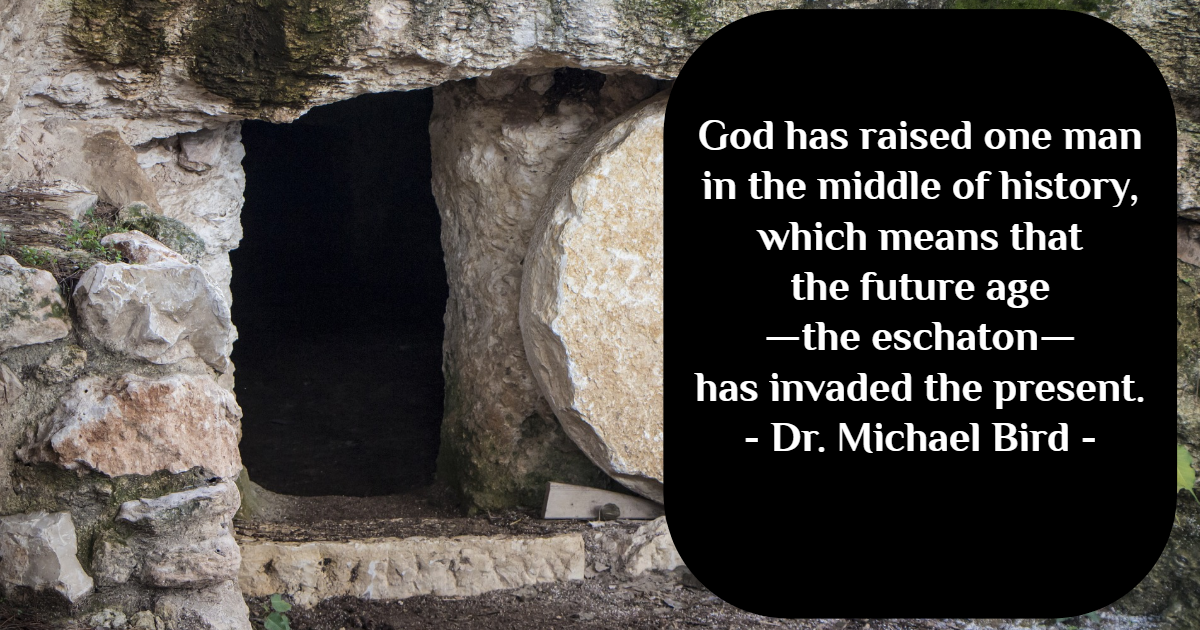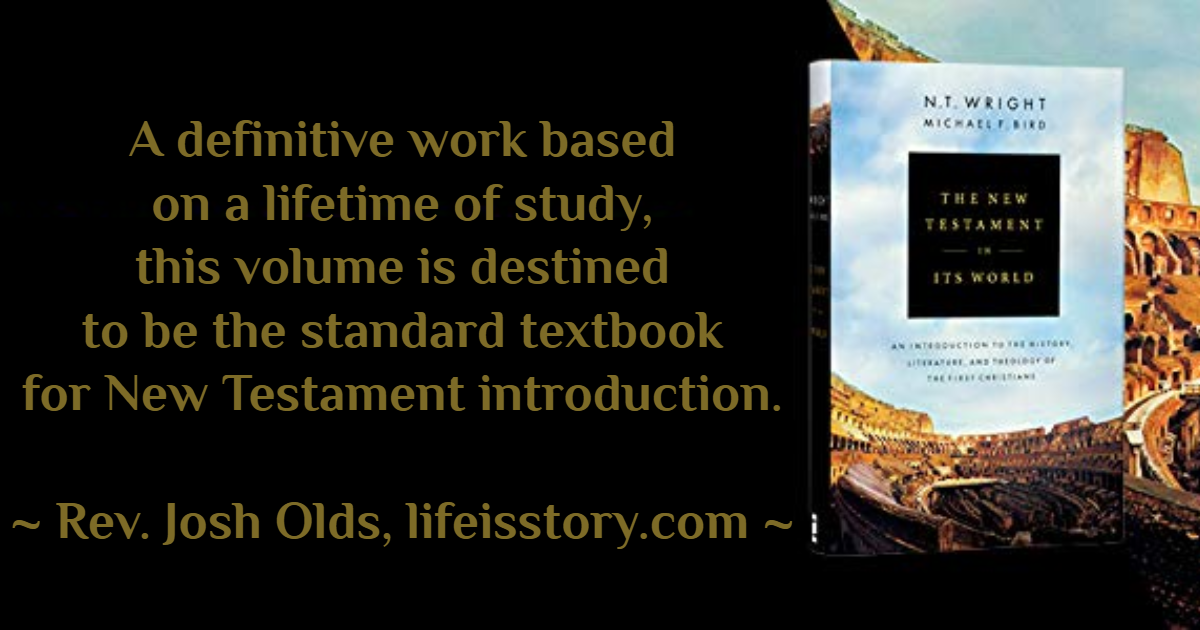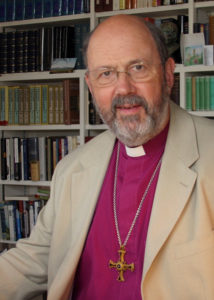
Podcast: Play in new window | Download
Subscribe: Apple Podcasts | RSS
The best way to describe The New Testament in its World is massive. It’s one of those volumes that literally stands on its own, a compendium of a lifetime of research. But it’s also accessible—not some dry and dusty tome, but a clearly-presented, comprehensive look into the context of the New Testament, destined to be the standard textbook of New Testament introduction.
Dr. Michael Bird will be the first to tell you that this is primarily N.T. Wright’s work—but it was Bird who was tasked with compiling all of Wright’s musings and compiling them into this comprehensive format, writing and editing, revising and refining, until getting to this final product.
About a month ago, I had the opportunity to talk to Dr. Bird about this book and what impact he hopes it will have on evangelical theology. You can listen to the full interview by clicking the play button above. Or, get a brief snippet here.
PURCHASE THE NEW TESTAMENT IN ITS WORLD
The Interview | Dr. Michael Bird – The New Testament in its World
This transcript has been lightly edited for brevity and clarity.
Listen the full interview by clicking the play button above, or visit us on Apple Podcasts, Spotify, Stitcher, or wherever you get your podcasts.
Josh Olds: One of the assertions in the book is that the gospel message that was announced by Jesus, the early followers of Jesus, is not always the same as the gospel message that gets proclaimed today. Can you just explain what you mean when you when you say that?
Dr. Michael Bird: Yeah, I think a lot of the gospel preaching that you—not always—but you get here tends to be very individualistic, very transactional, and also, to a large degree of being platonic and it’s all about how my sinful soul can one day escape to the afterlife in some sort of heavenly and blissful state.
But the gospel is an announcement that’s God’s Kingdom has come in the life, death and resurrection of the Lord Jesus. And by repenting of our sins and by putting faith in him, we thereby participate in that very Kingdom. Now articulating the Gospel that way is probably a little bit different to what you might find in some things like the Four Spiritual Laws or sort of analogous things…[where] for all it matters Jesus could have been born in Narnia. It doesn’t really matter what he did as long as he had a sinless birth and a sin bearing death, the entire history of Israel and ministry of Jesus doesn’t really matter at all.
And yet the books we call Gospel that actually do contain the gospel: the story of his life, the story of his ministry, the story of his message, if you like. So, this is important stuff they will miss out if we’re not paying attention to it.

Josh Olds: I think this kind of dovetails my next question…Because out of all the things in Christianity, the one thing that Christians think they understand is the death, burial, resurrection of Jesus…So you’re going to tell me that the real meaning of the resurrection is different than how it’s perceived today?
Dr. Michael Bird: What we’re presented with in the New Testament is the belief that in Christ, the Messiah has been handed over for our sins. He’s borne our condemnation. But at the same time his resurrection is his vindication. And when we have union with the Messiah through the Spirit, we participate in his vindication, or in his—dare I say—in his justification. In other words, the resurrection is what vindicates Jesus. It justifies Jesus: that he’s not a messianic pretender, that he’s not a false prophet—he is the Son of God. He’s designated the Son of God in power by being raised from the dead. And when we have union with him, we participate in his justification.
You know, that is a very different way of packaging, how we think about our justification now, being in the right with God, based not only on the cross but also on the resurrection. The other thing to say is it strongly means that the New Age To Be has begun…Most Jews believe the resurrection was going to happen corporately, to all of Israel, at the end of history. You know, think of John 11. [Martha] says, “Yes, I know he will rise in the resurrection at the last day.”
When Jesus is raised, it creates quite a conundrum because instead of raising all Israel at the end of history, God has raised one man in the middle of history, which means that future age—the eschaton—has invaded the present. And that means we are living as we often like to say, between the now and the not yet.
So I would say the meaning of resurrection, it’s bound up with our salvation. It’s not merely the after-dinner mints of Good Friday, our salvation is bound up with the resurrection. And it also means there’s the launching of the new age and that’s why we are here.
Josh Olds: I think that viewpoint really changes the way that a lot of Christians, if they understood it, would have to face their own Christianity…There’s very much a sense that within evangelical Christianity, okay, we’ll get it in and we’ll get him saved. And then we store them in the churches until they die. And I think that’s why there’s a lack of discipleship within the church, because there’s not a firm idea, or conviction that this is the Kingdom here, that we are part of that kingdom age right now. It’s all about the future.
And so a lot of Christians are left just going “Oh, what do I do now?” And you know, we see glimmers of it. Okay, we know that you’re supposed to follow Christ. So we’ll do a little bit. It’s very hard, I think, for Christians to connect that to know that the kingdom has been brought to Earth. I really feel like if believers understood that better, they would change how they live and it wouldn’t just be like we’re waiting on a hope for the future—but that we’ve begun to receive that hope even now today in our everyday lives.
Dr. Michael Bird: Yeah, I think that’s exactly I think what Christians need to be taught…We certainly do build for the Kingdom and the things that we do will certainly, I think, echo in the New Creation. I mean, that’s how Paul finishes 1 Corinthians 15. He doesn’t say, “Okay, Christ is risen. So sit back, kick off your shoes, and wait for God to annihilate your enemies and kind of you know, teleport you to heaven like Star Trek.” He says, “Now Christ has been raised so you can get busy, knowing the things that you do will echo in eternity.” That is a very different way of giving a story of discipleship: telling people what they do now actually will matter in this age and in the age to come.
The Book | The New Testament in its World

Finally: an introduction that captures the excitement of the early Christians, helping today’s readers to think like a first-century believer while reading the text responsibly for today.
The New Testament in Its World is your passageway from the twenty-first century to the era of Jesus and the first Christians. A highly-readable, one-volume introduction placing the entire New Testament and early Christianity in its original context, it is the only such work by distinguished scholar and author N. T. (Tom) Wright.
An ideal guide for students, The New Testament in Its World addresses the many difficult questions faced by those studying early Christianity. Both large and small, these questions include:
In short, The New Testament in Its World brings together decades of ground-breaking research, writing, and teaching into one volume that will open readers’ eyes to the larger world of the New Testament. It presents the New Testament books as historical, literary, and social phenomena located in the world of Second Temple Judaism, amidst Greco-Roman politics and culture, and within early Christianity.
Written for both classroom and personal use, the benefits of The New Testament in Its World include:
- A distillation of the life work of N. T. Wright on the New Testament with input from Michael Bird
- Historical context that situates Jesus and the early church within the history, culture, and religion of Second Temple Judaism and the Greco-Roman world
- Major sections on the historical Jesus, the resurrection of Jesus, and Paul’s chronology and theology
- Surveys of each New Testament book that discuss their significance, critical topics like authorship and date, and that provide commentary on contents along with implications for the Christian life
- Up-to-date discussions of textual criticism and the canonization of the New Testament
- A concluding chapter dedicated to living the story of the New Testament
- Available Video and Workbook companion resources to enhance learning and experience the world of the New Testament
- Illustrated with visually rich pictures, maps, charts, diagrams, and artwork; plentiful sidebars provide additional explanations and insights
The Author | Dr. Michael Bird
 Michael grew up in Brisbane before joining the Army and serving as a paratrooper, intelligence operator, and then chaplains assistant. It was during his time in the military that he came to faith from a non-Christian background, and soon after felt a call to ministry. He graduated with a BMin from Malyon College (2001) and Honours and PhD from the University of Queensland (2002, 2005). Michael taught New Testament at the Highland Theological College in Scotland (2005-9) before joining Brisbane School of Theology as lecturer in Theology (2010-12). He joined the faculty at Ridley as lecturer in Theology in 2013.
Michael grew up in Brisbane before joining the Army and serving as a paratrooper, intelligence operator, and then chaplains assistant. It was during his time in the military that he came to faith from a non-Christian background, and soon after felt a call to ministry. He graduated with a BMin from Malyon College (2001) and Honours and PhD from the University of Queensland (2002, 2005). Michael taught New Testament at the Highland Theological College in Scotland (2005-9) before joining Brisbane School of Theology as lecturer in Theology (2010-12). He joined the faculty at Ridley as lecturer in Theology in 2013.
Michael describes himself as a “biblical theologian” who endeavours to bring together biblical studies and systematic theology. He believes that the purpose of the church is to “gospelize,” that is to preach, promote, and practise the Gospel-story of the Lord Jesus Christ. Remembered by students for his mix of outlandish humour and intellectual rigor, he makes theology both entertaining and challenging.
As an industrious researcher, Michael has written and edited over thirty books in the fields of Septuagint, Historical Jesus, the Gospels, St. Paul, Biblical Theology, and Systematic Theology. His book Evangelical Theology is an attempt to develop a truly gospel-based theology that promotes the advance of the gospel in Christian life and thought. He also runs a popular blog called Euangelion. Michael is married to Naomi and they have four children.
The Author | N.T. Wright
 N.T. Wright, one of the world’s leading Bible scholars, is the chair of New Testament and Early Christianity at the School of Divinity at the University of St. Andrews, an Anglican bishop, and bestselling author. Featured on ABC News, The Colbert Report, Dateline, and Fresh Air, Wright is the award-winning author of Simply Good News, Simply Jesus, Simply Christian, Surprised by Hope, How God Became King, Scripture and the Authority of God, Surprised by Scripture, and The Case for the Psalms, as well as the recent translation of the New Testament The Kingdom New Testament and the much heralded series Christian Origins and the Question of God.
N.T. Wright, one of the world’s leading Bible scholars, is the chair of New Testament and Early Christianity at the School of Divinity at the University of St. Andrews, an Anglican bishop, and bestselling author. Featured on ABC News, The Colbert Report, Dateline, and Fresh Air, Wright is the award-winning author of Simply Good News, Simply Jesus, Simply Christian, Surprised by Hope, How God Became King, Scripture and the Authority of God, Surprised by Scripture, and The Case for the Psalms, as well as the recent translation of the New Testament The Kingdom New Testament and the much heralded series Christian Origins and the Question of God.
